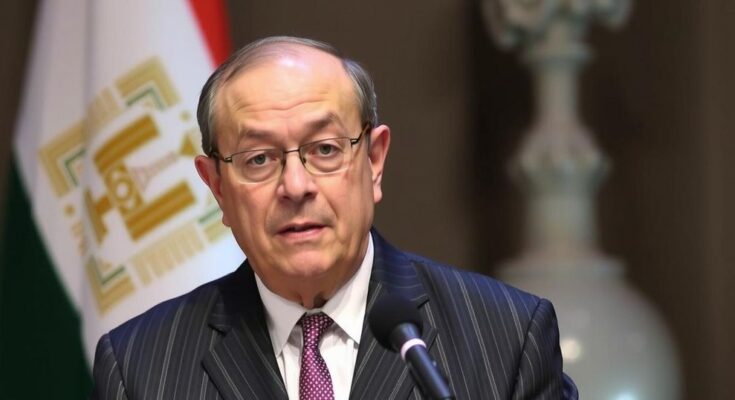Egypt’s Foreign Minister Badr Abdelatty has postponed a planned visit to Syria amid a persistent anti-HTS media campaign. This decision highlights the complexities of Egypt’s diplomatic relations, particularly regarding its position towards the transitional Syrian government, amidst internal political concerns and fears of terrorist affiliations. The postponement suggests a continued hardline stance despite recent communications between Egyptian and Syrian officials.
The visit of Egypt’s Foreign Minister Badr Abdelatty to Damascus, originally set for next week, has been postponed amidst a robust anti-Hayat Tahrir al-Sham (HTS) media campaign in Egypt. This decision has raised eyebrows regarding Egypt’s diplomatic approach towards for Syria, particularly following Abdelatty’s recent telephone conversation with Asaad Al-Shibani, the transitional Syrian government’s representative. The ongoing media narrative in Egypt has labeled HTS as terrorists, reinforcing the government’s stance against engagement with groups they categorize as violent.
Egyptian state-run media have maintained a stringent line against HTS, hurling accusations of terrorism and warning against any discussions with the group. In contrast to other regional actors who have engaged with the Syrian opposition, Egypt’s hardline stance represents a significant detachment from the evolving situation in Syria. Notably, the recent communication between Abdelatty and Al-Shibani indicated potential changes in Egypt’s diplomatic posture, yet the postponed visit suggests a continuation of its previous policy.
Former Deputy Foreign Minister Abdullah Al-Ashaal remarked on the implications of Abdelatty’s phone call, describing it as “highly significant,” yet clarifying it does not denote formal recognition of the new Syrian government. He emphasized that Egypt’s position reflects a pragmatic attempt to engage with the current dynamics in Syria without compromising its fundamental views on the ongoing crisis.
Since the ousting of Islamist President Mohamed Morsi in 2013, President Abdel Fattah Al-Sisi’s administration has suppressed dissent, especially from Islamists. In stark contrast to Morsi’s support for Syrian rebels, Sisi has favored Bashar al-Assad’s regime. Furthermore, Egypt’s fear of domestic unrest prevents it from fostering ties with Syria’s interim government, resulting in strict restrictions against Syrian refugees.
HTS is regarded as a terrorist entity by the United States, EU member states, Turkey, and Egypt, though it has not conducted attacks outside Syria and distanced itself from its former association with Al-Qaeda. There are indications that Western nations and Middle Eastern regional powers may be reassessing their perspectives on HTS and al-Sharaa as influential figures in the post-Assad scenario.
Egypt’s foreign policy concerning Syria has been shaped significantly by its internal political dynamics and the overarching aim to consolidate power under President Abdel Fattah Al-Sisi. Following the 2013 coup that dethroned the Brotherhood-led government, Egypt’s engagement with Syria has been cautious, particularly in relation to groups associated with Islamism. The ongoing media narrative surrounding HTS reflects not only domestic political considerations but also a broader reluctance to be seen as engaging with entities perceived as threats to national security. The geopolitical landscape has been shifting, with neighboring countries reassessing their ties with Syrian opposition factions, while Egypt maintains a resolute stance partly driven by fear of domestic instability.
The postponement of the Egyptian Foreign Minister’s visit to Syria illustrates the complexities of Egypt’s foreign policy towards its regional neighbors, particularly in light of internal political pressures and prevailing media narratives. Despite a recent communication signaling possible diplomatic engagement, Egypt’s firm stance against HTS and its unwavering refusal to recognize the new Syrian government reflect deep-seated fears regarding potential implications for its own regime. As regional dynamics continue to evolve, Egypt appears hesitant to adapt its strategies, prioritizing domestic stability over broader diplomatic relations.
Original Source: www.newarab.com




